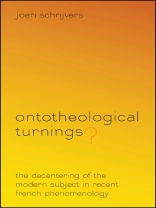This incisive work examines questions of ontotheology and their relation to the so-called ‘theological turn’ of recent French phenomenology. Joeri Schrijvers explores and critiques the decentering of the subject attempted by Jean-Luc Marion, Jean-Yves Lacoste, and Emmanuel Levinas, three philosophers who, inspired by their readings of Heidegger, attempt to overturn the active and autonomous subject. In his consideration of each thinker, Schrijvers shows that a simple reversal of the subject-object distinction has been achieved, but no true decentering of the subject. For Lacoste, the subject becomes God’s intention; for Marion, the subject becomes the object and objective of givenness; and for Levinas, the subject is without secrets, like an object, before a greater Other. Critiquing the axioms and assumptions of contemporary philosophy, Schrijvers argues that there is no overcoming ontotheology. He ultimately proposes a more phenomenological and existential approach, a presencing of the invisible, to address the concerns of ontotheology.
Cuprins
Acknowledgments
Abbreviations
Introduction
1. Some Notes on a French Debate
Introducing Ontotheology
The Present and Our Obsession with Objects
Jean-Yves Lacoste: The Experience of Faith
Jean-Luc Marion: Experiencing the Given
Emmanuel Levinas: The Other’s Otherness
Theology ‘after’ Ontotheology
The Question concerning Ontotheology
2. Phenomenology, Liturgy, and Metaphysics: Jean-Yves Lacoste
Lacoste versus Heidegger: Ontological Differences
The Liturgical Experience
The Experience of Resting and of the Work of Art
Ontology and Affectivity
Conclusion and Critical Remarks
3. From the Subject to the ‘
Adonné’: Jean-Luc Marion
The Given Phenomenon, the Gift, and the Third Reduction
Reduction, Givenness, and Metaphysics
The Saturated Phenomenon
The
Adonné
Conclusion and Critical Remarks
4. On Miracles and Metaphysics: From Marion to Levinas
Miracles and Saturation: John Caputo versus Merold Westphal
To See or Not to See? Marion’s Response to Jocelyn Benoist
Longing for Ockham: Of Other Gifts and Other Lovers
A Phenomenology of the Icon?
How to Avoid a Subject and an Object: Levinas’ ‘Relation without Relation’
Overcoming Ontotheology with Levinas
5. Levinas: Substitutiong the Subject for Responsibility
Language and the ‘Relation without Relation’
Levinas and the Critique of the Critique of Representation
Representation and Kenosis:
Giving to the Other
Conclusion: Derrida and Levinas
Otherwise than Being: Condemned to Be Good
6. Intermediary Conclusions and the Question concerning Ontotheology
Intermediary Conclusions
Reprise: Theology ‘after’ Ontotheology
7. “And There Shall Be No More Boredom”: Problems with Overcoming Metaphysics
Dasein, Metaphysics, and Dasein’s Metaphysics (Heidegger)
Another Metaphysics: The Metaphysics of the Other (Levinas)
A Significant Other? From the Other to the Individual (Marion)
Responding
ad infinitum?
The Consequences of Overcoming Metaphysics for Faith and Theology
8. Marion and Levinas on Metaphysics
Marion and/on Ontotheology
Marion’s Understanding of Ontotheology
Levinas and/on Ontotheology
Conclusion: Toward a Phenomenology of the Invisible
Theological Turnings
The Privation of Immanence
Heidegger and the Phenomenology of Presencing
Metaphysics and Society: More Ado about Nothing
Turning to Theology? Of the Unredeemedness of the Human Being
Notes
Index
Despre autor
Joeri Schrijvers is a Postdoctoral Researcher of the Research Foundation-Flanders (FWO), Faculty of Theology, at Catholic University of Leuven in Belgium. He is coeditor (with Lieven Boeve, Wessel Stoker, and Hendrik M. Vroom) of
Faith in the Enlightenment? The Critique of the Enlightenment Revisited.












